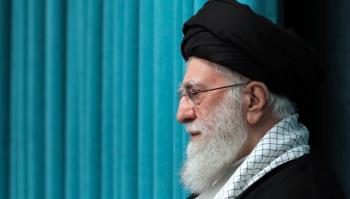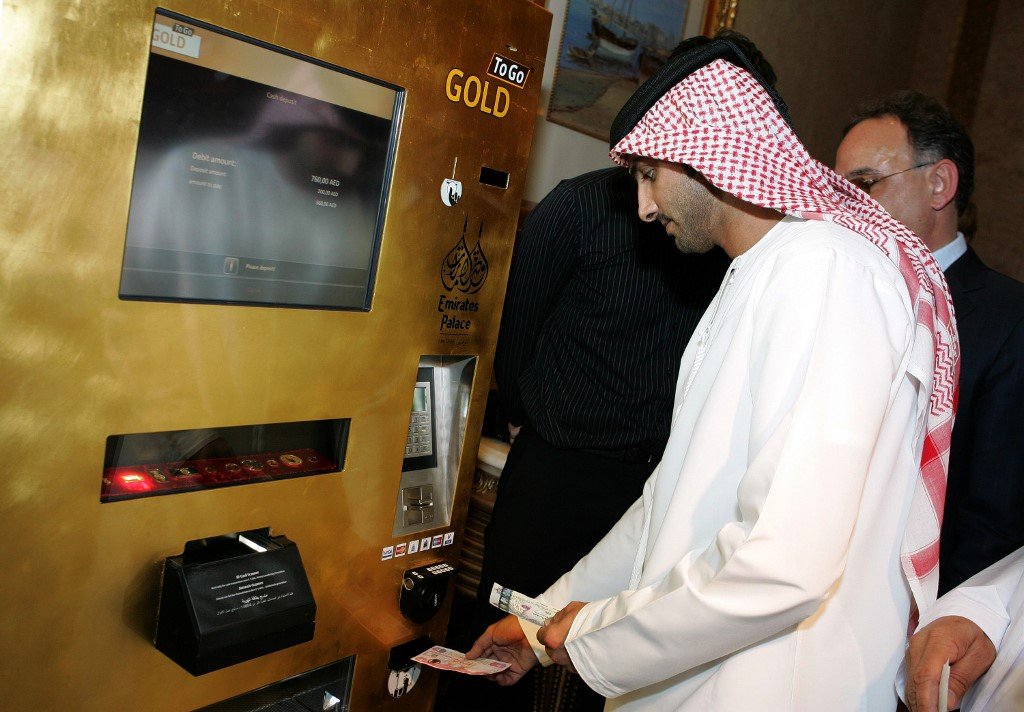There are no mines under Dubai's sands with artisanal miners or children toiling away trying to strike gold. But there is the Dubai Gold Souk and refineries that vie with the largest global operations as the United Arab Emirates (UAE) strives to expand its position as a major gold hub.
In recent years, the UAE, with Dubai in particular, has established itself as one the largest and fastest-growing marketplaces for the precious metal, with imports rising by 58 percent per annum to more than $27bn in 2018, according to data collated by the Observatory for Economic Complexity.
With no local gold to tap, unlike neighbouring Saudi Arabia, the UAE has to import gold from wherever it can, whether it be legitimately, smuggled with no questions asked, sourced from conflict zones, or linked to organised crime.
Gold has become so important to Dubai's economy that it is the emirate's highest value external trade item, ahead of mobile phones, jewellery, petroleum products and diamonds, according to Dubai Customs.
And it is the UAE's largest export after oil, exporting $17.7bn in 2019. Gold's importance has only increased as Dubai's oil reserves have dwindled and the UAE has tried to diversify its economy.
But to retain the trade, the UAE may have to police the sector better, having been the focus of numerous reports about its role in the dirty gold trade, and chastised by the Financial Action Task Force (FATF), the world's standards settings body for anti-money laundering rules, for inadequate oversight of the sector in an evaluation report published in April.
A report by the UK's Home Office and Treasury earlier in December also named the UAE as a jurisdiction vulnerable to money laundering by criminal networks because of the ease with which gold and cash could be moved through the country.
"If Dubai wants to see more international customers they need to seriously reform their gold due diligence policies. Otherwise, they risk losing a lot of customers, and the gold trade is such a big part of the economy," said Sasha Lezhnev, deputy director of policy at The Sentry, an NGO which released a report on conflict gold and Dubai in November.
The question is whether Dubai and the Emirates will clean up their act.
Blood gold
The Sentry's investigation found that 95 percent of gold officially exported from Central and East Africa, much of it mined in Sudan, South Sudan, the Central African Republic and the Democratic Republic of Congo, ends up in the emirate.
"Much of the conflict gold is smuggled to neighbouring countries and then exported to Dubai," said Lezhnev.
Gold has funded armed conflict in the region for years, but this year there has been a spike due to the surge in gold prices amid market volatility related to the Covid-19 pandemic, with an ounce appreciating by $364, or 25 percent, to over $1,800 since January.
"It is kind of the new blood diamonds, if you will, due in part to the rise in gold prices. There are gold rushes in many artisanal areas, so more child miners, more criminal groups and more corruption. Gold is so small and valuable it's easy to smuggle," said Lezhnev.
Blood gold, as it could be called, is not just flowing into Dubai from Africa.
"Gold is also coming out of South America, and the hub is increasingly Dubai. Once gold goes into Dubai, it will be virtually impossible to ascertain where it came from and under what circumstances," said David Soud, head of research and analysis, for strategists I.R. Consilium, in Washington DC.
Dubai has become a major hub for gold of all provenance due to laissez faire policies.
"It is attractive as there is not much due diligence when buying gold, and policy and enforcement loopholes allow for the country to be a magnet for this kind of smuggled gold," said Lezhnev.
Customs checks are minimal, and cash is king when it comes to buying gold at the Dubai Gold Souk, or from a gold vending machine at Abu Dhabi's Emirates Palace hotel.
"The Dubai Multi Commodities Centre does follow, in principle, guidelines [on gold], but when you can have off-the-books cash transactions for hand-carried gold, potentially in the millions of dollars, that makes meaningful accountability very difficult," said Soud.
In 2016, according to Reuters, the UAE declared gold imports from 25 African countries, worth $7.4bn, which had not declared any exports to the UAE. The Emirates declared $3.9bn more in gold from most of the 21 other countries it imported from than was declared in exports.
The Swiss connection
Dubai is not the only gold player with dirt, and even blood, on its hands.
"It is not just Dubai, it's also Switzerland. The Swiss get large quantities of gold from Dubai. The Swiss say they are not getting gold from certain countries [connected to conflict gold], but instead from Dubai, yet the gold in Dubai is coming from these countries. Dubai is complicit, but Swiss hands are equally dirty as they can't cut Dubai from the market," said Lakshmi Kumar, policy director, at Global Financial Integrity (GFI) in Washington DC.
Switzerland is the world's largest refiner, while around half of all gold goes through the country at some point, according to anti-corruption group Global Witness. Switzerland's trade is tied to the UK, which imports around a third of all gold.
London also handles around 80 percent of all mined gold, with refiners shipping gold to the London Bullion Markets Association (LBMA) vaults, which held just over half-a-trillion dollars worth as of October 2020.
It is the LBMA, a private organisation, that sets the standards on best practices to follow as part of its Global Precious Metals Code. However, the LBMA has been criticised for rubber-stamping gold coming out of its "good delivery list" of 70 refineries, which are not supposed to source gold without adequate due diligence into where and from whom the metal was sourced and independent third-party auditing.
Reports have linked Swiss refiner Valcambi, which is on the LBMA's "good" list, to gold sourced from the UAE-based refiner Kaloti Jewellery International. Kaloti has been accused of importing smuggled and conflict gold, and of running a "ghost" gold mine in Suriname, South America, where no gold is actually refined but a fake purchasing certificate is provided – a perfect instrument for laundering money.
"Kaloti is an old story, and comes up again and again. Valcambi has in a good year imported 300 tonnes from the UAE to Switzerland - only from Kaloti, nearly $30bn in two years," said Mark Pieth, president of the board of the Basel Institute on Governance and author of Gold Laundering.
Global Witness released a detailed investigation into the two refineries earlier this year. Kaloti did not respond to interview requests from Middle East Eye. The LBMA referred MEE to its Responsible Sourcing Programme.
Valcambi told MEE in an email that it "hasn't had a business relationship with Kaloti since November 2019" and "has never sourced materials from Sudan". The Indian-owned company added it has "successfully passed all our LBMA audits since 2012".
One of the criticisms of the LBMA's code is that it relies on third-party auditing. "The problem is the system doesn't really work. The punch line is that conflict gold could easily go from Kaloti to Valcambi, and Valcambi still gets the LBMA stamp of approval," said Pieth.
An assessment of the LBMA's standards found that auditors are not trained for auditing gold refineries. "It is a shocking censure," said Kumar. "To me, almost all of these norms are self-regulatory, and not binding."
Indicative of the issue of refineries paying auditors to do supposedly independent audits is a case involving global auditing firm EY (formerly Ernst & Young) and Kaloti in Dubai.
In a case dating back to 2012, EY auditor Amjad Rihan blew the whistle on Kaloti handling billions of dollars in cash transactions by importing gold coated with silver from Morocco, and handling gold from countries considered high-risk, such as Sudan.
Rihan was sacked for airing the firm's dirty laundry. The case was heard in London this year, with the court awarding Rihan $10.8m in damages. The judgment is under appeal and due to be heard in February 2021.
The case also highlighted lax regulatory oversight in Dubai.
"Dubai is an environment where challenging the authorities is potentially risky, and a really difficult environment in which to expose wrong-doing, and for independent oversight," said Paul Dowling, a Leigh Day solicitor representing Rihan.
"It is an industry that requires urgent reform as there's so much potential for conflicts of interest, which has been borne out in all these issues being exposed now."
Protected by Washington?
Political expediency appears to have enabled Kaloti - and Dubai - to escape censure despite allegations of money laundering. In the US Treasury's FinCEN files leak, released by the International Consortium of Investigative Journalists (ICIJ), Kaloti was flagged by US banks for $9.3bn in suspicious transactions between 2007 and 2015.
Earlier this year, the ICIJ reported on a three-year investigation by the US Drug Enforcement Administration into Kaloti that was dropped due to political pressure to not upset US relations with the UAE.
"A lot of countries get put on black or grey lists by the FATF [for inadequate anti money laundering controls], but the UAE has just as much or more money laundering risks from its actions yet never gets listed," said Kumar.
"The US has a clear incentive to protect the UAE, as it is an important ally in the fight against terrorist financing and is a significant military ally in the region. With the recently negotiated peace treaty between the UAE and Israel, it is unlikely we'd ever see the UAE being blacklisted as it would run counter to US foreign policy priorities."
Some pressure, however, has been exerted on the UAE by the LBMA, which in November threatened Dubai and other gold hubs with blacklisting gold bullion exports if they do not meet its regulatory standards, including on sourcing and supply chains, eliminating cash transactions and support for artisanal and small scale mining.
The Dubai Multi Commodities Centre blasted the LBMA's move, with the CEO Ahmed Bin Sulayem, in a LinkedIn post, likening it to "a ploy akin to changing the rules of Monopoly on a discretionary basis in order to keep other players off the board," and an "authoritarian approach to maintain its majority control through conjecture and double standards".
In a volte-face, however, the UAE backed the LBMA initiative in December.
"It presents an opportunity to finally enact some change, where many of us NGOs, companies and government officials have been asking for reforms from the Emiratis and other jurisdictions over the years to minimal avail," said Lezhnev.
Whether the UAE is just paying lip-service to the LBMA and FATF regulations or will actually tighten up oversight of the sector remains to be seen.
Source: Middle East Eye



























